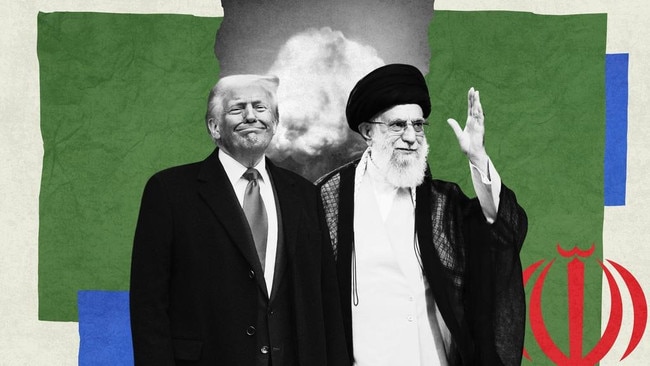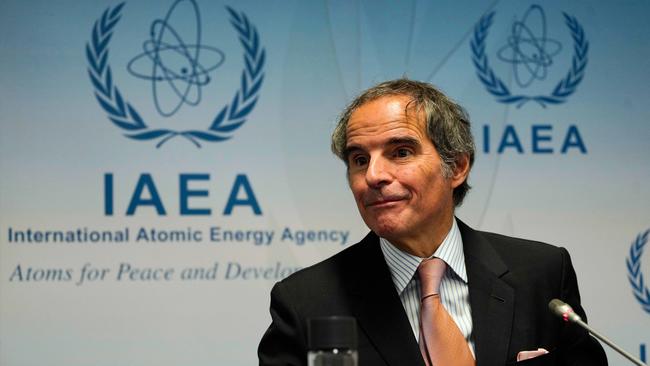Iran builds up near weapons-grade uranium stockpile despite nuclear talks
US officials say it could take Iran less than two weeks to convert this highly enriched uranium into enough material for a nuclear weapon.

Iran has continued to produce highly enriched uranium at a pace of roughly one nuclear weapon’s worth a month over the past three months despite talks between Washington and Tehran on a new nuclear deal, the United Nations atomic agency said.
The International Atomic Energy Agency said in a confidential report circulated to member states that Iran had grown its stockpile of 60 per cent-enriched uranium to 408.6 kilograms from 274.8 kilograms in early February, an increase of around 50 per cent. The Wall Street Journal viewed a copy of the report.
That means Iran has enough highly enriched uranium for roughly 10 nuclear weapons, based on IAEA measures of the minimum fissile material required, up from at least six at the time of the last report.
US officials say it could take Iran less than two weeks to convert this highly enriched uranium into enough weapons-grade 90 per cent fissile material for a nuclear weapon.
Iran says its nuclear work is purely peaceful. The US says that Tehran hasn’t decided to build a nuclear bomb but that it would need only a few months to assemble one.
While the report doesn’t provide a monthly breakdown, it presented no evidence that Iran has slowed the accumulation of 60 per cent-enriched material since the start of talks with the US on April 12. Iran is the only non-nuclear-armed country producing 60 per cent-enriched uranium.
The IAEA has said it can’t verify that Iran’s nuclear program is for peaceful purposes.
“The significantly increased production and accumulation of highly enriched uranium by Iran, the only non-nuclear-weapon State to produce such nuclear material, is of serious concern,” IAEA Director General Rafael Grossi said in the report.
Iran and the US have held five rounds of nuclear talks and are seeking to complete a framework for a deal that would set out joint positions on key issues to be decided. President Trump has said the talks are progressing well, although the two sides are divided on whether Iran can continue to enrich uranium under a deal.
Even if a framework is agreed, it could take protracted and difficult technical talks to reach a final deal. Trump withdrew the US in 2018 from the 2015 nuclear agreement, which placed tight but temporary restrictions on Iran in exchange for the lifting of international sanctions.

In its documents circulated to member states on Saturday, the IAEA also presented a comprehensive, longer report detailing Iran’s failure to cooperate with a probe, started in 2019, into undeclared nuclear material found in Iran.
The report was demanded by European powers after Iran repeatedly failed to provide credible answers to IAEA questions about the nuclear material. Iran says it has answered the questions with all information available.
The agency said in its report that Iran’s “lack of answers and clarifications” has led it to conclude that Tehran had an “undeclared structured nuclear program” until the 2000s and that some activities used undeclared nuclear material.
The agency said that it assesses that “Iran retained unknown nuclear material and/or heavily contaminated equipment, and other assets, arising from” the nuclear program at a site in Tehran from 2009 until 2018, “after which items were removed from the location.”
The report is an important stepping stone in the European powers’ threat to reimpose the sanctions lifted from Iran under the 2015 nuclear deal. That could spark an immediate confrontation between Iran and Western powers over Tehran’s nuclear work, potentially scuttling the latest talks.
European diplomats have said if Iran failed to cooperate with the agency, they would follow up Saturday’s report with a push to declare Iran in noncompliance with its obligations as a member of the Non-Proliferation Treaty. The treaty seeks to stop the spread of nuclear weapons.
A noncompliance resolution could be voted on at the coming meeting of the IAEA board of member states, which starts June 9.
European officials have said they will decide by the summer whether to press ahead with the so-called snapback of sanctions on Iran at the UN Security Council, if Tehran doesn’t start to fully cooperate with the nuclear probe. The option of reimposing the sanctions expires in October under the 2015 agreement.
Iran has warned it could withdraw from the NPT and change its nuclear doctrine if sanctions are reimposed. The country’s leadership has pledged not to pursue nuclear weapons.
Israeli Prime Minister Benjamin Netanyahu said the reports underlined that the international community “must act now” to stop Iran’s nuclear program.
“The agency presents a stark picture that serves as a clear warnings sign: despite countless warnings…Iran is totally determined to complete its nuclear weapons program,” he said in a statement.
Israel, which is widely believed to have nuclear weapons but has never acknowledged that, has threatened military strikes against Iran’s nuclear facility if Tehran seeks to build a bomb. Trump confirmed this week he had told Israel that attacking Iran now wouldn’t be appropriate.
While Iran’s structured work on a nuclear weapon is believed to have ended in 2003, Western officials say it has continued with nuclear weapons-related experiments since then. In 2024, US intelligence officials said Iran was carrying out work that would help Tehran learn how to make a nuclear weapon.
The agency said in its report that Iran’s lack of “technically credible answers” leaves open the possibility that Iran may still have undeclared nuclear material that it is able to use for non-civilian purposes.
Wall Street Journal





To join the conversation, please log in. Don't have an account? Register
Join the conversation, you are commenting as Logout